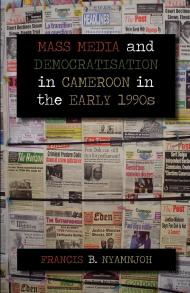Livrel(PDF, HTML) 208p.
(Politics and International Affairs)
ISBN: 9789956717811
In the on-going democratic debate, the Cameroonian media have not played the role of objective mediators. A one-party logic, of which government, opposition and the public are guilty, has prevented Cameroonian multipartyism from addressing the major issue: that of how best to bring about real participatory democracy. So far, democracy has served mainly as a face powder, an empty concept or slogan devoid of concrete meaning used to justify reactionary propaganda by the ruling party and its acolytes on the one hand, and revolutionary propaganda by the opposition and some pressure groups on the other. This polarisation in the Cameroonian political arena corresponds to a similar polarisation in the Cameroonian media. One can identify two main political tendencies in the media: first, there are those who argue that all the government does is good and in the best interest of Cameroon, and that the radical opposition is void of patriots and motivated only by selfish, regional, or ethnic self-interests. These comprise the publicly owned, government-controlled electronic and print media on the one hand, and pro-government privately« owned newspapers on the other. Second, there are those who claim that all the radical opposition does or stands for is in the best interest of Cameroon, and that the government and its allies are only motivated by a stubborn love of power and other selfish pursuits. These comprise the bulk of the privately owned papers. The media are polarised into two diametrically opposing camps, each claiming to know and represent the best interests of the Cameroonian people.








